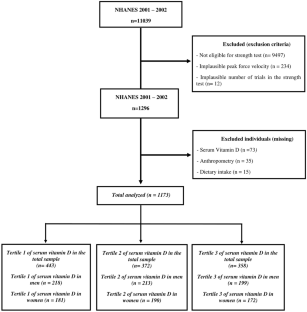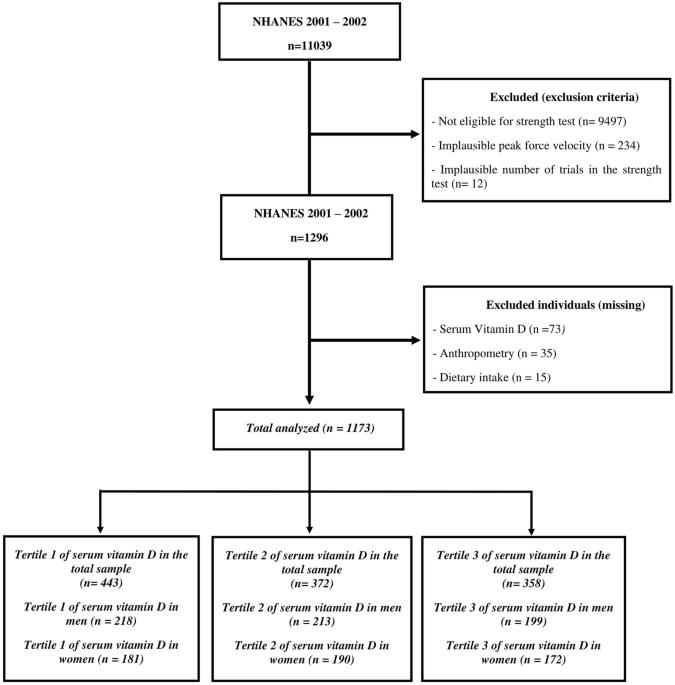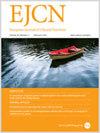老年人血清维生素 D 与肌肉力量的关系与性别有关:Nhanes 2001-2002.
IF 3.6
3区 医学
Q2 NUTRITION & DIETETICS
引用次数: 0
摘要
背景:目的:评估老年人血清 25 羟基维生素 D [25(OH)D] 水平与肌肉力量之间的关系,并评估这种关系是否与性别有关:这项横断面研究利用了 2001 年至 2002 年间进行的美国国家健康与营养调查(NHANES)的数据。共有 1173 名年龄在 50-85 岁之间的人(男性 630 人,女性 543 人)参与了分析。膝关节伸肌的等动力峰值是通过运动交流器等动力计进行评估的。使用标准化液相色谱-串联质谱法测量血清 25(OH)D 水平。在对潜在混杂因素进行调整后,进行了线性回归分析,以估算血清维生素 D 水平各层次肌肉力量的系数和 95% 置信区间:结果:在老年男性中,血清维生素 D 水平的三等分与肌肉力量呈正相关(p-趋势 = 0.007),而在老年女性(p-趋势 = 0.140)或总样本(男性和女性合计;p-趋势 = 0.139)中未观察到相关性:结论:血清维生素 D 水平与老年男性的肌肉力量呈正相关,而与老年女性的肌肉力量无相关性。这些结果表明,维生素 D 与力量之间的关系可能取决于性别。本文章由计算机程序翻译,如有差异,请以英文原文为准。


Sex-dependent association of serum vitamin D with muscle strength in older adults: NHANES 2001–2002
Although several studies have suggested a potential positive association between serum vitamin D levels and muscle strength in older adults, it remains unclear whether this relationship is sex-dependent. To evaluate the association between serum 25 hydroxyvitamin D [25(OH)D] levels and muscle strength in older adults and to assess whether this association is dependent on sex. This cross-sectional study utilized data from the National Health and Nutrition Examination Survey (NHANES) conducted between 2001 and 2002. A total of 1173 individuals aged 50–85 years (630 men and 543 women) were included in the analysis. The peak isokinetic force of the knee extensor was assessed using a kinetic communicator isokinetic dynamometer. Serum 25(OH)D levels were measured using the standardized liquid chromatography-tandem mass spectrometry method. Linear regression analyses were conducted to estimate coefficients and 95% confidence intervals for muscle strength across tertiles of serum vitamin D levels, adjusting for potential confounders. Tertiles of serum vitamin D were positively associated with muscle strength in older men (p-trend = 0.007), whereas no association was observed in older women (p-trend = 0.140) or in the total sample (men and women together; p-trend = 0.139). Serum vitamin D levels were positively associated with muscle strength specifically in older men, whereas no association was observed in older women. These results suggest that the relationship between vitamin D and strength may be sex-dependent.
求助全文
通过发布文献求助,成功后即可免费获取论文全文。
去求助
来源期刊
CiteScore
10.60
自引率
2.10%
发文量
189
审稿时长
3-6 weeks
期刊介绍:
The European Journal of Clinical Nutrition (EJCN) is an international, peer-reviewed journal covering all aspects of human and clinical nutrition. The journal welcomes original research, reviews, case reports and brief communications based on clinical, metabolic and epidemiological studies that describe methodologies, mechanisms, associations and benefits of nutritional interventions for clinical disease and health promotion.
Topics of interest include but are not limited to:
Nutrition and Health (including climate and ecological aspects)
Metabolism & Metabolomics
Genomics and personalized strategies in nutrition
Nutrition during the early life cycle
Health issues and nutrition in the elderly
Phenotyping in clinical nutrition
Nutrition in acute and chronic diseases
The double burden of ''malnutrition'': Under-nutrition and Obesity
Prevention of Non Communicable Diseases (NCD)

 求助内容:
求助内容: 应助结果提醒方式:
应助结果提醒方式:


